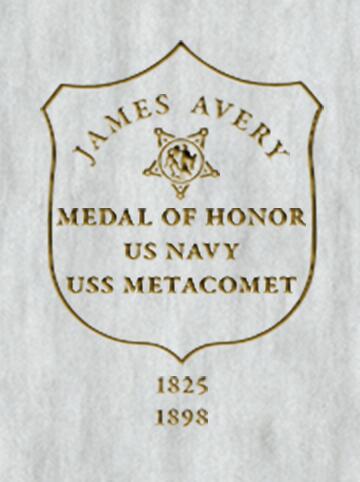Seaman James Avery
USCIS Montgomery Field Office

Seaman James Avery was born in Scotland in 1825 and later settled in New York, where he joined the Navy. During the Civil War, he served on the USS Metacomet, a wooden sidewheel steam gunboat. On August 5, 1864, the Metacomet, part of the West Gulf Blockading Squadron, entered Mobile Bay with 17 other ships under the command of then-Rear Admiral David Glasgow Farragut. The Union fleet attacked a smaller Confederate fleet and three forts that guarded the entrance to Mobile Bay. Farragut’s charge into Mobile Bay may have been the most dramatic moment of the naval war, comparable to Pickett’s charge at Gettysburg. From this exchange came one of the best-known sayings in military history, commonly paraphrased as: “Damn the torpedoes! Full speed ahead!”
During the battle, a Confederate torpedo sank the Union monitor Tecumseh. Seaman Avery aided in rescuing 10 members of the Tecumseh crew while enduring heavy enemy fire. He received the Medal of Honor on January 15, 1866. His citation reads in part:
Seaman Avery braved the enemy fire which was said by the admiral to be “one of the most galling” he had ever seen, and aided in rescuing from death ten of the crew of the Tecumseh, eliciting the admiration of both friend and foe.
After the Navy began using modern steamships, Seaman Avery went to work as a machinist, then as a cook. According to a January 16, 1898, article in The New York Times, the crew on his new ship had no knowledge of Seaman Avery’s Medal of Honor until the captain asked him about a “small parcel wrapped up in a piece of newspaper and carefully tied with a small piece of lashing.”
The captain and other officers in the room were stunned to learn of his award. According to the article, Seaman Avery, a humble man, replied: “I did like the rest of the men that day, and I never expected anything more than my pay and rations. We tried to do our duty, and when we saw the men in the other ship being shot down and some drowning, we could only try to help them. God knows it was hard to see them being murdered without much chance for escape.” When Seaman Avery was discharged, his captain “took him to Washington and found a good berth for him in one of the bureaus of the Navy Department.”
He died on October 11, 1898. He is buried in Captain Ted Conaway Memorial Naval Ceremony in Portsmouth, Virginia.
